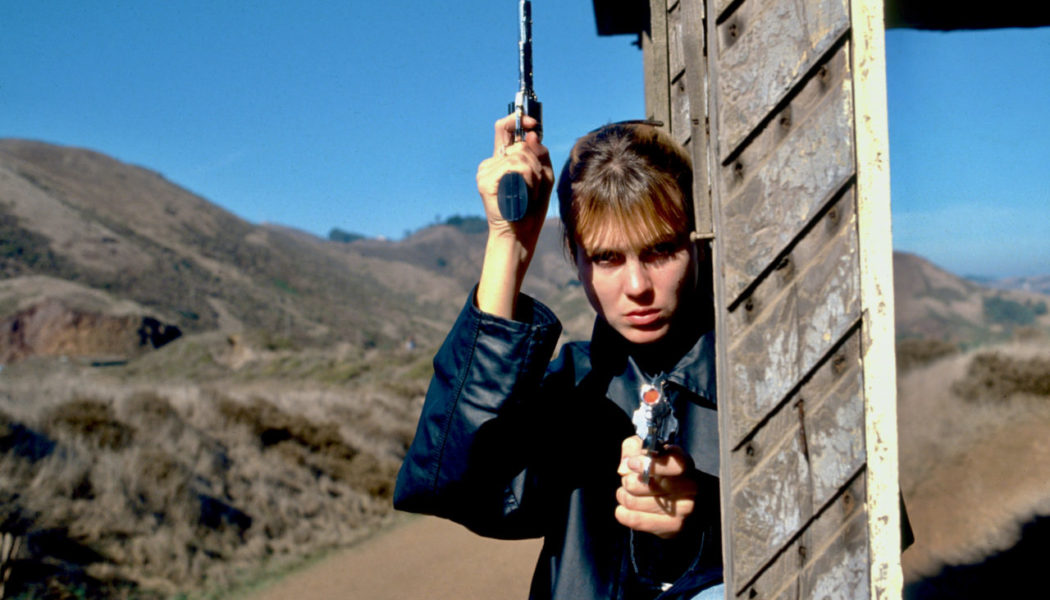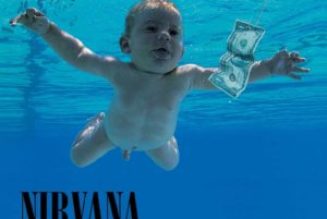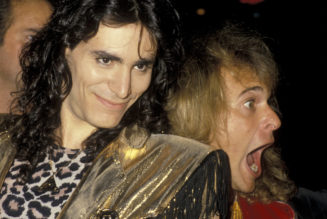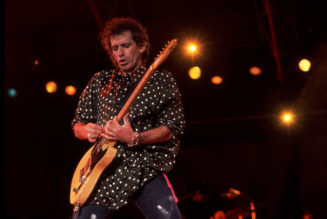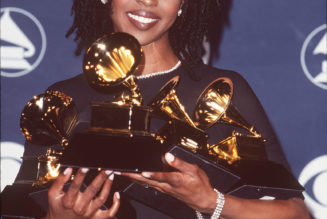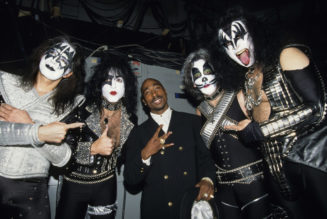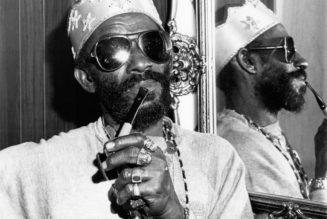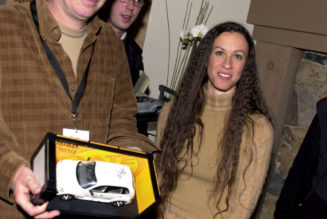A version of this article originally appeared in the March 1994 issue of SPIN. In honor of Juliana Hatfield’s latest album, Blood, being released on May 14, 2021, we’re republishing this story.
It takes a lot of hard work to keep an enigma in motion. Juliana Hatfield has never been afraid of the fierce work ethic of enigma maintenance. “I get pleasure in being misrepresented,” she says casually, shredding a toothpick into a pile of splinters on the table, “because it proves that people can’t figure me out. It’s good that people don’t know the real me. I wouldn’t want people to really know me. That would be creepy.”
Hatfield has certainly given her listeners a lot of personality crises to puzzle through. Her six albums—two solo, four with the Blake Babies—bristle with lush melodies, sun-streaked guitars, and a live wire of a voice that constantly spirals through the usual all-American teenage hobbies: unrequited love, eating disorders, doomed erotic obsession, self-mutilation, hiding in your room, wishing you were in a band so people would listen to you. Onstage, Hatfield is a mesmerizing swirl of frumpy glamour. She’s half teen-hermit basket case, half guitar-totin’, Nietzsche-quotin’, punk-rock dream come true. Just who is this weirdo?
On this drizzly New York afternoon, she’s a few hours away from a skiing vacation, her first time off in months. Hatfield has a reputation as a thorny interview—she likes asking questions more than answering them. Today, she’s not so much defensive as distracted. We’ve planned to go see the Miró exhibit at the Museum of Modern Art—”chiaroscuro is in full effect!” she exclaims—but we linger so long at the China Grill, bearing down on wild mushroom profusion pasta and jade pesto with dragon whispers, that it grows too late for museum-hopping. “This is the first time I’ve ever been sick of the road,” she groans. “I hope I don’t burn out on it. That would suck.”
As we go walking through the rain and the snow with nowhere to go, Hatfield croons the best song ever written on the subject, 10cc’s “The Things We Do For Love.” “They don’t write songs like that anymore,” she sighs. Her own songs can tell you plenty about the things we do for love, and yet for all their casual, tossed-off charm, they’re full of fools and loners and hysterics who do some uncommonly strange things for it. Hatfield is a singer-songwriter in the mode of Brian Wilson, Nick Drake, and Poly Styrene, translating private fantasies of mirth, sloth, and lechery into incendiary pop songs, and yet, although she’s only 26, she’s lasted longer as an onstage performer than any of them. How long can she keep this up? How long can she make a perfectly healthy audience believe in—and sing along with—a chorus hook as ridiculous as “I’m ugly / With a capital U”?
Like Pavement, like Dinosaur Jr. —shamen of slacker cool on opposite coasts— Hatfield communicates sheer grace, sheer insouciance, even as she revels in her own eccentric vocal tics. It’s hard to imagine any other singer, except maybe Pavement’s Stephen Malkmus, carrying off such transcendently wack lyrics as “She’s the one who would’ve taken me / To my first all-ages show / It was the Violent Femmes / And the Del Fuegos.” But Hatfield not only gets those clunky lines onto the radio, she makes them radiate cool, goofing through the syllables of “Del Fooo-waaay-goes” until the awkwardness of adolescence sounds like it’s been rewired before our very ears. Hatfield knows how to make a good joke out of loneliness, scrambling codes of pleasure. In an alternative-rock milieu full of prudes and literalists, she’s a sly wit, a high priestess of mindfuck. Forget the Joni Mitchell comparisons. She’s more like a punk rock Huck Finn; she lies just to keep in practice. As she sings on “I Got No Idols,” Become What You Are’s final track, “I’m a liar, that’s the truth.”
Juliana Hatfield hardly ever raises her voice, preferring to speak in an intricately modulated mumble. The vast majority of her sentences trail off into her favorite punctuation mark: “I don’t know.” It’s easy to see how she gets accused of being a delicate petunia blossom. She looks as if she’s just stepped out of a Dante Gabriel Rossetti painting, except that she’s scruffed out in clunky black shoes, baggy jeans, and an enveloping wool crew-neck. Her oversize black leather jacket drapes protectively around her like a crumpled candy wrapper. I’m not her grandmother or anything, but it’s good to see her eat her pasta, and when her specially requested steamed vegetables and brown rice with miso sauce arrives, she digs into a massive carbohydrate hit for a sunless day.
One time Hatfield does pipe up is when I mention I heard a rumor that she’s going out with Johnny Depp. “Oh, you did, did you?” she harrumphs. “I don’t know how that rumor got started.” Uncomfortable as an object of speculation and fantasy, she often sounds disingenuously clueless about celebrity, as if she could control the way her audience fleshes out her image. In interviews, Hatfield has revealed many secrets perhaps she now wishes she’d hidden, from her eating disorders to her virginity, and these days she’s trying to be guarded. She’s still at work inventing herself.
It makes sense that Hatfield is wary of being pinned down; she’s an adult survivor of adolescence who grew up scheming of escape and revenge. She could’ve been the morose misfit Lou Reed sang about in “Rock and Roll” and “Stephanie Says.” “All the time in high school, I was kind of a loner,” says Hatfield. “I couldn’t really relate to the high school thing.”
Hatfield grew up in Duxbury, Massachusetts, or as she called it in an early Blake Babies song, “Deluxe-bury.” An excruciatingly preppy seaside suburb, Duxbury lies stranded between the bustle of Boston and the languor of Cape Cod, where the bored teenagers of suburbia cultivate just enough Brahmin-boho scruffiness to throw off their parents’ tennis game. Deluxe-bury is a bundle of suburban paradoxes, offering enough sun and sea to seduce any Beach Boys fan, but with a desperate undercurrent of small-town New England despair. “It’s not a very big town,” Hatfield says. “Everybody knows everybody. It’s a very weird place, ’cause it’s very kind of, I don’t know, stuck up.”
The daughter of the Boston Globe’s fashion editor, Hatfield tried to connect with high school life by toiling on the literary magazine, but spent most of her time alone writing poetry. “I didn’t like it much on the page, I didn’t like looking at it,” she remembers. “So I set it to music, and I liked it much better that way.” Discovering her voice in music, however, was more daunting, until one of her pals, playing guitar in a local party band called the Squids, dared Hatfield to get up and sing with them one night. With the Squids, Hatfield learned the Rush songbook, and, closer to her heart, the hits of the Police, with whom Hatfield confesses to having been “totally obsessed.” “We did ‘Roxanne,’ ‘Message in a Bottle,’ ‘Can’t Stand Losing You,’ ‘So Lonely,’ ” Hatfield boasts. Along with every other kid in New England, Hatfield made her pilgrimage to Sullivan Stadium in August 1983 to witness the local visitation of the Police’s Synchronicity tour, an MTV-sponsored new-wave lovefest featuring opening acts the Fixx and A Flock of Seagulls. With Sting and the lads onstage, and 100 billion castaways in the audience, Hatfield got a taste of the intersection of solitary reverie and star power.
The real turning point for Hatfield was discovering punk rock. X’s Under the Big Black Sun had blown her mind, thanks to a new presence in her life, a 23-year-old “older sister figure.” “She was like a nanny, but she was also dating my older brother,” Hatfield explains. “She came to live with us when I was 16 and brought her record collection, and that was where I discovered all this greatness. She played me this Boston music I’d never heard, like Mission of Burma and the Lyres. She was from Duxbury but she had been living in the big, bad city.” It was the nanny that chaperoned Hatfield to Storyville, a ratty Kenmore Square club that’s now a Pizzeria Uno, for her first all-ages show: the Violent Femmes and the Del Fuegos.
Strange as it sounds, schlocky ’80s new wave was a scene of initiation for Hatfield, and her records keep returning to this portrait of the artist as a young spaz. While her voice cracks and swoops as giddily as any in pop music, Hatfield keeps conjuring up the frustration of a castaway in Deluxe-bury, an exile in Guyville, discovering something wilder than her own backyard. “Feed me something hot enough / Don’t be afraid to treat me rough,” Hatfield sings in one of her greatest I-hafta-get-the-fuck-out-of-this-town songs, “Feelin’ Massachusetts.” “Show me the way to the shore / Throw me out / ‘Cause I’m so so so so bored.”
Hatfield finally escaped to the big, bad city to attend the Berklee School of Music in Boston. “Really depressed and really miserable” on her own, Hatfield began to spy on two of her fellow students, a couple from Indiana named John and Freda. She fixated on them, even wrote songs about them.
John Strohm and Freda Love Boner (her real name, improbably enough) called the group “Blake Babies” after meeting the poet Allen Ginsberg in Cambridge and asking him to christen their band. Struck by Hatfield’s hag charisma, Strohm and Boner decided she’d make a perfect frontperson. “We both had an active crush on her,” Strohm says. “We thought we were the only two weird-asses there, but Juliana had braces, her complexion wasn’t so good, she’d just stare at the floor in her leather jacket and floppy ponytail. We thought, ‘Hey, she’s really neurotic. Cool!’ ”
When Strohm and Boner dropped by Hatfield’s dorm room to invite her to join the Blake Babies, the three tried to play the Velvet Underground’s “Femme Fatale” as an audition. “But she was so shy,” Strohm says, “we couldn’t even hear her with the microphone on.” In the fall of 1986, the Blake Babies all moved into a condo Hatfield’s mom had bought behind Boston’s Symphony Hall. Paying rent to Mrs. Hatfield, the band had a home and a revolving cast of characters to help trash the furniture. The “Condo Pad,” as it was dubbed, swarmed with neighborhood musicians from Bullet LaVolta and Moving Targets who’d drop in to write a song, bake cookies, or sleep on the floor. Soon after meeting Hatfield at a local pizza shop, Evan Dando moved in. The Condo Pad was ringing with the sounds of cats and guitars. For Hatfield, it was “magical.”
“That whole experience of It,” she remembers, “when it was first happening, when I first wanted to write music and play with other people, it was an amazing spiritual thing. An awakening. It was just so important to me, ‘Cause up until I found a band and started writing, I felt really alone. I wanted to play music, but I didn’t know how to get a band together. When I finally did, it was such a big thing in my life, it was more important to me than anything. It was like my baby—like I would’ve killed anybody who tried to sabotage my music.
“It’s different now. I have more things to care about. I have more of a life.”
The Blake Babies released their 1987 EP, Nicely, Nicely, on their own Chewbud label. One of Nicely, Nicely’s ungainly highlights, “Tom and Bob,” was Hatfield’s furtive love song written from afar to Strohm and Boner. “Tom and Bob” serenades a couple who stick out from the rest of the town like a “silver thumb”; you can hear a band getting together in the raw, tinny music, but in the vocal you can hear a desperately lonely geek from the suburbs summoning up a belief in her own voice out of an obsession with her new bandmates. The word was beginning to become flesh.
After two superbly barbed garage-pop albums, 1989’s Earwig and 1990’s Sunburn, the Blake Babies fell apart. “I was sick of democracy,” Hatfield admits. When she quit the band, though (Strohm and Boner soon formed Antenna), she sank back into depression. “I got scared for a while,” says Hatfield. “Stupid thoughts, like, ‘If this goes on much longer, I’ll have to kill myself.’ It sounds really melodramatic in retrospect, all those thoughts you have when you’re depressed, like, ‘I’m gonna be alone forever, I’m gonna die alone, I’m never gonna find another band, so I may as well kill myself.’ ”
That misery spawned Hatfield’s first solo record, Hey Babe, a song cycle with training wheels. Hey Babe is practically a concept album about a young woman dreaming up fantasy loverboys and choking on her own terror. “Everybody Loves Me But You” and “I See You” begin with singer-songwriter clichés and then get lost in weird detours and absurd confessions, while the climactic “Ugly” calls out the self-esteem SWAT team over a folk-tinged acoustic guitar (“I’m in the kitchen ’cause I can’t take the heat/ I want to leave but I stay in my seat”).
Hatfield recorded 1993’s Become What You Are with her now-regular touring band, the Juliana Hatfield Three, a name that already makes Hatfield wince. The Three includes two veterans of the Condo Pad scene, drummer Todd Philips (formerly of Moving Targets and Bullet LaVolta) and bassist Dean Fisher, a pal of Hatfield’s since Duxbury. “He had a crush on me in high school,” she admits sheepishly, “and I had a crush on him, but we never told each other. We just kinda said hi in the halls.”
Although Become What You Are features Hatfield’s strongest songs since Sunburn —”My Sister,” “Spin the Bottle,” “Feelin’ Massachusetts” — it’s an experimental work in progress, and many of its experiments ring as false as the title. Nobody’s ever written a good song about finding a baby bird dying in the gutter (“For the Birds”), and trust me, nobody ever will. “Supermodel” labors unconvincingly to turn an easy target into a hard-won moral certainty. Hatfield isn’t crazy about Become What You Are. “I don’t love my records yet,” she says, “but I think I’m on the right path.” Her fantasy is to make a solo album, overdubbing all the instruments, covering Dinosaur Jr.’s 1987 classic You’re Living All Over Me song for song. “Then I can quit music,” she laughs. “I’d have a record of my own music that I could actually listen to for pleasure, so there’d be nothing left to accomplish.”
In the meantime, Hatfield has definitely managed to keep people listening, partly by manipulating her own enigmatic public persona. Since Hey Babe, she’s come to specialize in dropping inflammatory, often contradictory bombshells, most notoriously telling a 1992 interviewer, “I’m a virgin. I’ve never gone all the way.” Hatfield has also been derided for her oft-stated complaint that women can’t play guitar. Hoping to fan the flames, I ask If she subscribes to any sort of biological essentialist theory about women’s hands preventing them from forming chords. “Tanya Donelly has teeny hands,” Hatfield says. “Like, half the size of mine, and she can make a normal chord.” Hatfield herself plays an SG guitar onstage —”just like Angus Young,” she notes proudly—and insists that women could be guitar heroes if they’d stop settling for the role of “women in rock.” “What is a woman in rock?” she asks “People ask me to generalize on that subject, like, just speak for all women. It’s a stupid line of questioning, so I give a stupid answer just to piss people off. And hopefully to make them realize it’s a stupid question.”
Hatfield’s enduring friendship with Evan Dando is another element in her mystique. Erstwhile roommates and frequent musical collaborators, Dando and Hatfield delight in teasing the public with evasive hints about whether sexual attraction has ever been a part of their relationship. One British music tabloid recently posed them under the headline, “IS SHE REALLY GOING OUT WITH HIM?” In the grand tradition of Gram Parsons and Emmylou Harris, Hatfield and Dando keep you guessing, while the mystery accommodates the fantasies of their audiences. Hatfield sings on half the tracks on the new Lemonheads album, including “It’s About Time,” a ballad subtitled on the sleeve “Written For Juliana Hatfield.” The lyrics detail a long-distance intimacy fraught with hesitant caution and fear, ending, “Have your people contact mine / And keep your lawyer on the line.” When Hatfield chimes in, the sheer physical beauty of their two voices opens up a sensual mobility that neither singer could clearly define if they wanted to. “Did you see the female singer behind Evan on Letterman?” Hatfield asks me. “She was singing my part. And getting all the words wrong!”
Hatfield professes not to understand why some listeners take her at face value. She seems genuinely surprised when I mention being frightened by a 1992 performance on MTV’s 120 Minutes in which, after a particularly unintelligible interview with Dave Kendall, she sang her then-unreleased “Feed Me,” a first-person tale of anorexia parodying Temple of the Dog’s “Hunger Strike”: “I’m growing hungry!” Where was she? Was it a joke? “Some of my songs are really real, like that one,” she says. “No song is completely me. But some songs are more me.”
Hatfield’s bottomless gift for clever incantations to the muses of femme-angst will always give her trouble with audiences who want her to tell it to them straight. A singer-songwriter named Melissa Ferrick has just released a goody-goody single, “The Juliana Hatfield Song,” complaining that Hatfield gets more airplay, and that, among other crimes, “Juliana Hatfield doesn’t even have a sister.” “I was not amused,” Hatfield says. “I’ve put out six records, and I’ve been working for six years.” But Ferrick isn’t the first to dog Hatfield for hiding behind a mask, and she won’t be the last. Hatfield’s plugged into a network of disguises and discourses where it’s too late to come clean, and it’s too soon to expect a straight answer. Her brilliance involves turning rock’n’roll clichés inside out with outrageous self-mockery, and yet because her melodies deliver a profound emotional kick, her ironies are never harmless. As the old song says, voices carry.
But there’s an ascetic streak in Hatfield, a shade of grim moral intensity that doesn’t fit in with the exuberance and surprise in her music. When her nerve fails her and she sings such trite sermonettes as “For the Birds” and “Supermodel,” she makes you remember that Poly Styrene (like her X-Ray Spex bandmate Lora Logic) gave up rock’n’roll to renounce the material world and join a Hare Krishna sect. Hatfield says she found the phrase “become what you are” in Nietzsche, and you have to admit, Nietzsche saw Hatfield coming a century away: “Whoever despises himself still respects himself as one who despises.”
“I love Nietzsche,” Hatfield raves. “If you’re not careful, if you’re too intense and focused on one thing, you go really nuts. In reality, anything can go to infinity, so you just run around in circles until you drop dead or go insane. It’s scary. But I think my laziness saves me.”
Hatfield calls me a couple days later from Idaho, where she’s been skiing. She sounds much mellower, out in the open air and on the slopes, calling from a room of her own. She tells me about a particularly cool ski trip she once took with Dando and J Mascis. “We’re pretty equally matched—we all have the same ability, but different styles. J skis like he plays guitar, it’s really cool. Really reckless, but also really graceful.”
And how does Hatfield ski? “Graceful and aggressive. You have to be aggressive to ski, it’s an aggressive sport. If you’re not, you’ll get hurt. If you don’t take control, the mountain will take control over you.” She pauses to think. “And knock you over.”
